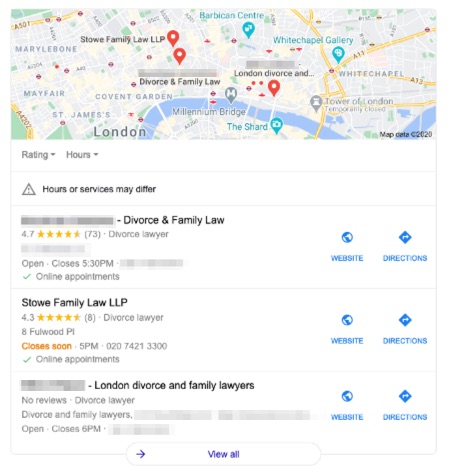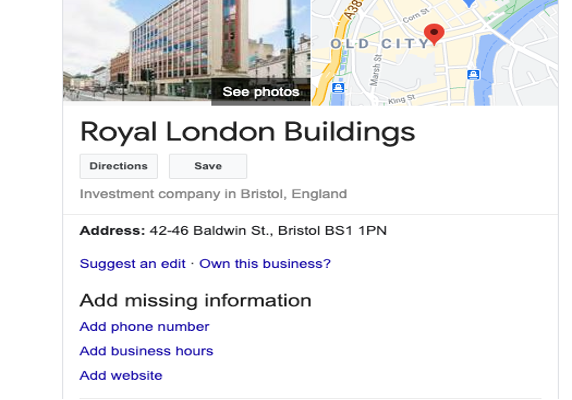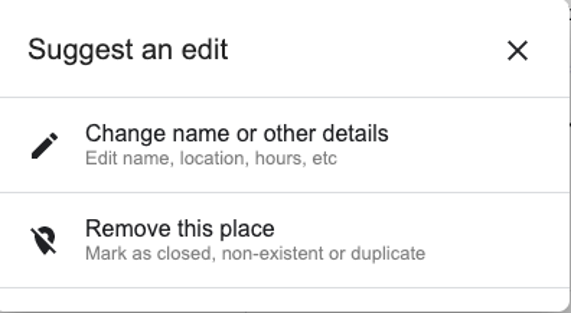On a standard Google results page, the available real estate in a local map pack is restricted to just three local Google My Business (GMB) listings. This obviously means that the space is highly contested and much fought over.
Ranking in one of the top three positions can make or break a local business in many industries, and as a result there are plenty of businesses who have been willing to bend or break Google’s own rules in attempts to game the system.
The most successful gambits for gaming the system have involved keyword stuffing the brand name to include an industry speciality or a location, as can be seen in two of the examples below:

![]()
![]()
![]() Google’s guidelines on names for GMB listings are clear:
Google’s guidelines on names for GMB listings are clear:
“Your name should reflect your business’ real-world name, as used consistently on your storefront, website, stationery, and as known to customers. … Including unnecessary information in your business name is not permitted and could result in your listing being suspended.”
But despite such clarity from Google two things are certain: 1) people still try to game the system, knowingly or not 2) it usually works…for a bit anyway (until you get reported and your listing receives an edit from Google). Get enough of these and your listing could get suspended. In the example above, only Stowe Family Law reflects their actual real-world name.
Now you might ask why this is an issue and why can’t Google do something about it? First of all, a Bright Local poll focusing on GMB listing spam revealed:
- 46% of local marketing respondents reported seeing spam often or very often.
- 45% of these said that it made it harder to rank their rule-following clients against the gamers. 32% said it made it much harder (it seems to work alas!).
- 59% said they had seen spam increase over the previous year.
- 69% said they were actively fighting spam for their clients (more on this later).
![]() Fake business reviews are the most common form of spam, followed by keyword stuffing business names, then multiple listings for the same business or one that makes it appear it is located where it is not.
Fake business reviews are the most common form of spam, followed by keyword stuffing business names, then multiple listings for the same business or one that makes it appear it is located where it is not.
Recently, here at Conscious, we have been seeing cases of ineligible listings for businesses that are not in that location. They have simply created a city keyword-stuffed URL and brand name, and use a mailing address that is not from a staffed office. These are doorway spammers attempting to capitalise on traffic from multiple cities for key search terms. You can usually identify these by noting the absence of the official Law Society/regulator information in the footer (required for most UK legal sector website). Try searching for common terms like “divorce lawyer in location” or “family law solicitor in location” swapping “location” for one near you, and you will have a good chance of seeing spam in action.
Google’s algorithms are not capable of weeding out these types of GMB spam. Identifying a fake review or an elaborated brand name is not possible at this time. Besides, frustrated GMB users might be more willing to pay for a local service ad to rise above all the real and fake competition (which obviously benefits Google!).
To combat GMB spam, Google has enlisted the aid of volunteers to report it when they see it. They are actually very quick to respond and will make justified edits to any GMB listing’s brand usually within 24 hours or less. Absolutely anyone can request that Google edit a listing’s brand name if they can demonstrate keyword-stuffing. You do it by “suggesting an edit” on the listing knowledge panel as seen in the example below:


![]() Provided your name change suggestion mirrors the actual brand name, Google will remove all the extra bits you have suggested. In our experience it is perfectly fine to leave “solicitors” at the end of a brand name without that being considered spam.
Provided your name change suggestion mirrors the actual brand name, Google will remove all the extra bits you have suggested. In our experience it is perfectly fine to leave “solicitors” at the end of a brand name without that being considered spam.
The main takeaway from this is that there is ample evidence of widespread GMB listing spam. Local SEO agencies are aware of this and will most likely be actively fighting it in their client’s local markets. If you have been stuffing your brand name and suddenly find it changed to correct branding, do not set it back to your preferred keyword-stuffed version. You don’t want to get reported again and risk a Google penalty or listing suspension.

